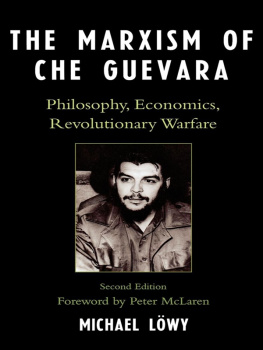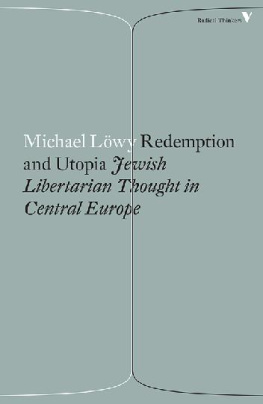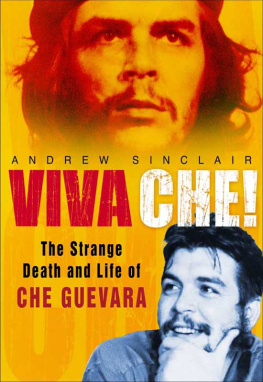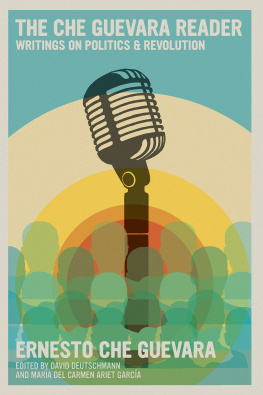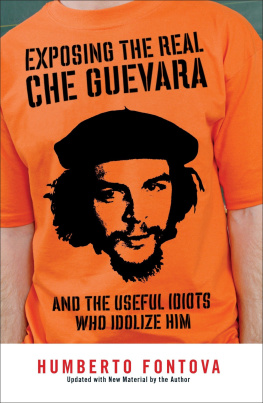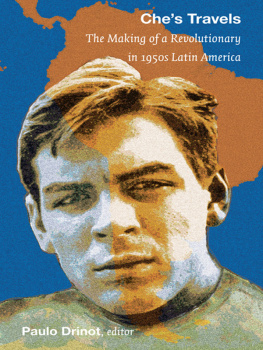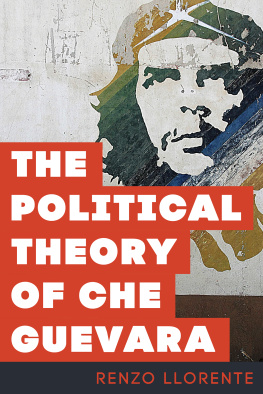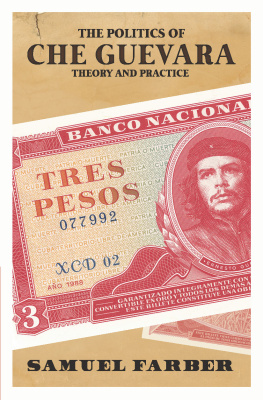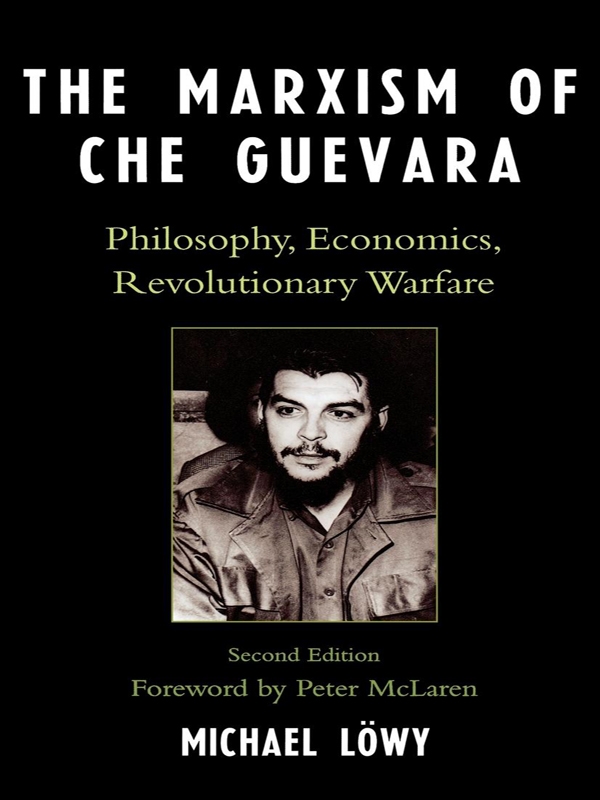Jorge Icaza, Huasipungo. This book, which Che read in 1954, very probably had a great effect on him. It describes the brutal and inhuman exploitation of the Indian peasants by their landlords allied with imperialism, and their spontaneous revolt, drowned in blood. It may be that this work played the same role for Che as Balzacs Les Paysans did in the formation of Marxs ideas about the peasantry.
MARXISM-LENINISM
Marx, Capital. Che read this for the first time in Guatemala and Mexico in 1954-1955, when he was moving toward communism. He reread it in 1963-1964, during the great economic discussion. He called it a monument of the human mind and based himself on it in his polemics against supports of market socialism.
Marx, The Economic and Philosophic Manuscripts of 1844
Marx, The Poverty of Philosophy
Marx, Critique of the Gotha Programme
It is probable, even though Che does not mention them explicitly, that he also read Marxs political writings: The Communist Manifesto, The Eighteenth Brumaire of Louis Bonaparte, and The Civil War in France.
Lenin, State and Revolution
Lenin, Imperialism: The Highest Stage of Capitalism
Lenin, On the United States of Europe Slogan
Lenin, Problems of Building Socialism and Communism in the USSR . In this collection Che was especially interested in Lenins polemic with the Menshevik historian Sukhanov (On Our Revolution, January 1923), which he regarded as highly relevant to the discussions that went on in Cuba.
Lenin, The War Program of the Proletarian Revolution
Trotsky, History of the Russian Revolution . This book was found by the Bolivian army in one of the guerrilla hiding places, and Che also mentions it in his diary (July 31, 1967). It is hard to see why he chose precisely this book rather than any other of Trotskys: perhaps he considered the October Revolution as a proletarian insurrection , significant in relation to the situation in Bolivia. It should be recalled that Debray, in his essay Castroism: The Long March in Latin America, calls Bolivia the only country in Latin America where a workers rising of the Soviet type is possible (in the mining areas). In his letter to the miners of Bolivia, Che refers to the role played by the mining proletariat, who will be able, thanks to the conditions created by the military development of the guerrilla struggle and its catalyzing political role, to deal that single effective blow under which state power will crumble. However that may be, the fact that he carried this book with him into the Bolivian maquis shows the interest he was taking, in the last stage of his life, in the Bolshevik tradition in general, and Trotskys ideas in particular.
Stalin, Problems of Leninism
Mao Tse-tung, Writings on War . Che read Mao in the Sierra Maestra in 1958, and it is certain, as he himself says, that he learned a lot from this. At the level of the strategy and tactics of guerrilla warfare, the similarity of his ideas to Maos is considerable. However, at the strictly political level, Che does not adopt certain classical Maoist analyses (new democracy, the bloc of four classes, etc.), precisely because his conception is that of the permanent revolution.
Giap, Peoples War, Peoples Army. In 1964 Guevara wrote an introduction to the Cuban edition of this book. Giaps work enabled him to enrich his theory of revolutionary war with the lessons of the Indochinese revolution: relations between army and people, role of the urban masses, role of the Leninist party, and so forth.
Otto Kuusinen, ed., Fundamentals of Marxism-Leninism: A Manual. A chapter of this book was published in Cuba in 1963, along with some speeches by Castro, under the title El partido marxista-leninista. Che wrote an introduction, which is one of the few documents in which he explicitly identifies himself with the Leninist theory of the party, vanguard of the working class, leader of this class, able to show it the way to victory.
LATIN AMERICA
Simon Bolivar
Fidel Castro
Jesus Silva Herzog. The experience of the Cardenas government in Mexico influenced Che, who read the writings of Silva Herzog in 1969, when he was preparing to expropriate the oil trusts in Cuba. Silva Herzog was the Mexican economist who drafted the law nationalizing the oil industry in Mexico in 1938.
Cabriel del Mazo, Students and University Government
Jos Marti. Like all the Cuban revolutionaries, Che held Mart in great veneration, and he especially appreciated his socialistic article on May Day and the workers struggle in the United States.
Rgis Debray, Revolution in the Revolution? Che appears to have made some criticisms of Debrays book, noted in the margins of his copy, which subsequently fell into the hands of the Bolivian army (Bolivian Diary, July 31, 1967).
MISCELLANEOUS
Clausewitz, On War
M. Djilas, The New Class
E. Fischer, The Necessity of Art
Sigmund Freud
Frantz Fanon, The Wretched of the Earth. In 1965 Che planned to write an introduction to Fanons book, which he had published in Cuba.
Marshal V. Sokolovsky, Military Strategy
POLITICAL ECONOMY
(Mostly read in connection with the economic debate of 1963-1964)
Academy of Sciences of the Soviet Union, Textbook of Political Economy
Paul Baran, The Political Economy of Growth
1. Ivonin, The Combines ( kombinats ) of Soviet Enterprises, Nuestra Industria, no. 4 (1963)
Oskar Lange, Current Problems of Economic Science in Poland
Ernest Mandel, Marxist Economic Theory
Victor Perlo, The Empire of High Finance
F. Tabeyev, Economic Research and Management of the Economy, Revue internationale, no. 11 (1963)
Appendix B: Neither Imitation nor CopyChe Guevara in Search of a New Socialism
In an article published in 1928, Jos Carlos Maritegui, the true founder of Latin American Marxism, wrote: Of course, we do not want socialism in Latin America to be an imitation or a copy. It must be a heroic creation. We must inspire Indo-American socialism with our own reality, our own language. That is a mission worthy of a new generation. His warning went unheard. In that same year the Latin American communist movement fell under the influence of the Stalinist paradigm, which for close to a half-century imposed on it an imitation and copy of the ideology of the Soviet bureaucracy and its actually existing socialism.

